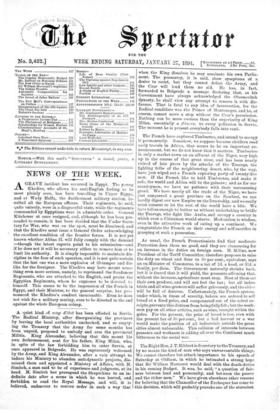A quiet kind of coup d'etat has been effected in
Servia. The Radical Ministry, after disorganising the provinces -by leaving the local authorities unchecked, and so empty- ing the Treasury that the Army for some months has been unpaid, proposed to embody and arm the provincial Militia. King Alexander, believing that this meant his own dethronement, sent for his father, King Milan, who, in spite of the law forbidding him to enter Servia, at -once appeared in Belgrade. He was rapturously welcomed by the Army, and King Alexander, after a vain attempt to induce his Ministry to abandon anti-dynastic projects, dis- missed them and appointed a Ministry of Affairs, with M. Simitch, a man said to be of experience and judgment, at its head. M. Simitch has prorogued the Sknptchina to an in- definite date after a scene in which he was hooted, and forbidden to read the Royal Message, and will, it is believed, endeavour to restore order in such a way that
when the King dissolves he may nominate his own Parlia- ment. The peasantry, it is said, show symptoms of a desire to resist, but they cannot defeat the Army, and the Czar will lend them no aid. He has, in fact, forwarded to Belgrade a message declaring that, as his Government have always acknowledged the Obrenovitch dynasty, he shall view any attempt to remove it with dis- favour. That is fatal to any idea of insurrection, for the Radical candidate was the Prince of Montenegro, and be, of course, cannot move a step without the Czar's permission. Nothing can be more curious than the superiority of King Milan, essentially a fidneur, to every politician in Servia. The moment he is present everybody falls into rank.


















































 Previous page
Previous page